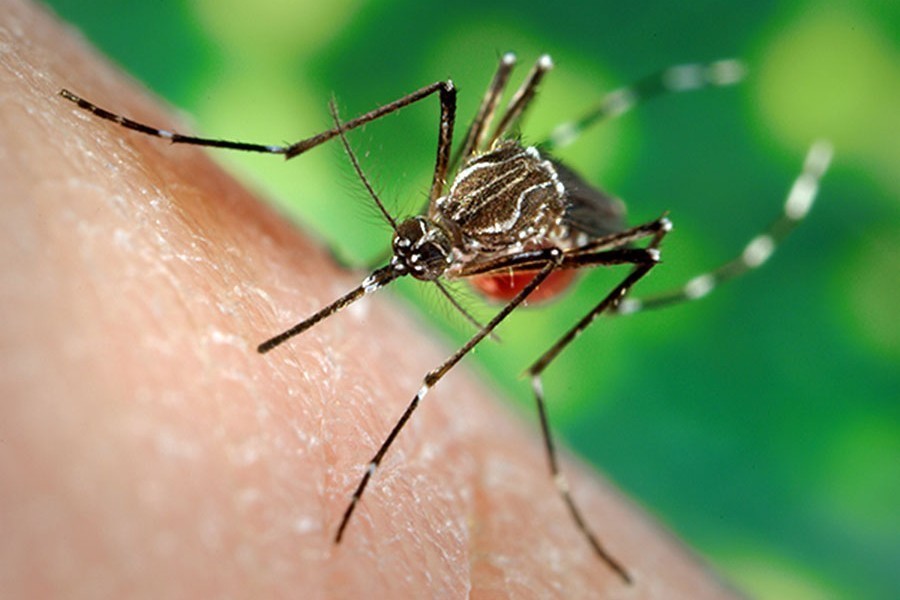As Bangladesh experiences the effects of climate change, it could also face a corresponding increase in vector-borne diseases like dengue, according to a study by the World Bank, bdnews24.com reports.
With falling humidity levels, rising temperatures, and increasing rainfall, the risk of dengue spreading may be higher in Dhaka city in the future, the study said, adding that changes in weather patterns have already negatively impacted human health and will only escalate in the future.
The Climate Afflictions Report, released on Thursday, finds a broader link between the shifting climatic conditions and the increase in respiratory, waterborne, and mosquito-borne diseases as well as mental health issues. With further climate change predicted, more physical and mental health issues are likely to emerge. The most vulnerable are children and the elderly, and those living in large cities like Dhaka and Chattogram.
“Bangladesh has remarkably tackled climate change challenges, despite being among the most vulnerable countries. It has built resilience against natural disasters and introduced homegrown solutions to improve agricultural productivity,” said World Bank Country Director Mercy Tembon. “With more evidence showing a pronounced impact of climate change on physical and mental health, Bangladesh needs to build on its success in adaptations to ensure a stronger health system that averts outbreaks of emerging climate-sensitive diseases.”
Bangladesh has experienced a 0.5 degrees Celsius increase in average temperature between 1976 and 2019 and is slowly losing the variations between seasons.
Summers are becoming hotter and longer, while winters are becoming warmer. The monsoon season is also growing longer as average rainfall increases in September and October, but declines between June and August, the traditional peak of the rainy season.
These changes mean that a number of climate-sensitive diseases have more suitable temperature and rainfall conditions to spread further. Dengue fever, spread by mosquitos, has doubled globally every decade since 1990, the study said, part of which is due to this kind of climate change.
Global evidence shows that there was 19.7 percent lower incidence of infectious diseases in the dry season than the monsoon, the study says. This is particularly true of vector-borne diseases like dengue and malaria, where a quarter of cases are reported in the monsoon, compared to 14 percent in the dry season. This means that longer monsoons are likely to lead to more cases of such disease.
The study cites the case of the dengue outbreak in Bangladesh in 2019. Dhaka experienced over half of the total dengue cases that year and 77 percent of the total related deaths. The heavy rain in Dhaka in February that year, combined with the favourable temperature and humidity in the following months exacerbated Dhaka’s outbreak, the World Bank said.
Urban areas, like Dhaka and Chattogram, were also more likely to experience incidence of vector-borne disease (34 percent) compared to the national average (25 percent) and rural areas (22 percent) during the monsoon.
During the dry season, Dhaka and Chattogram also had more cases of respiratory illness, which could be caused by higher levels of air pollution.
The change in the climate could also have some effect on mental health, such as anxiety. The study found that anxiety is elevated by increasing temperature and humidity levels. It also found that urban residents were more anxious than their rural counterparts, while men were generally more susceptible to anxiety than women.
As the effects of climate change intensify, the negative impact on health could also amplify.
The World Bank projects that average temperatures across Bangladesh will rise by 1.4 degrees Celsius by 2050 and 2.4 degrees Celsius by 2100, while annual rainfall may increase by 74 millimetres by 2040-2059.
A worst-case scenario of a 4 degrees Celsius rise in global temperature “would increase health-related stress at an unprecedented pace and consequently overburden the global health systems to an extent where adaptation would no longer be feasible”, it said.
The study presented four recommendations to cope with this developing problem.
First, to attain more localised weather information and improve disease surveillance to trace changes to climate-sensitive diseases. This can be done by expanding the number of weather stations and strengthening the Ministry of Health and Family Welfare’s routine surveillance capacity.
Second, to create a climate-based early warning system for dengue that will use weather data to predict outbreaks.
Third, to increase community engagement to control vectors – such as eliminating breeding grounds for mosquitos.
And, finally, the study said that mental health issues merited urgent attention and that the overall situation in the country needed further study as depression, anxiety, and other such matters are largely ignored due to cultural norms.


